BJMP Quezon City Jail - Male Dormitory
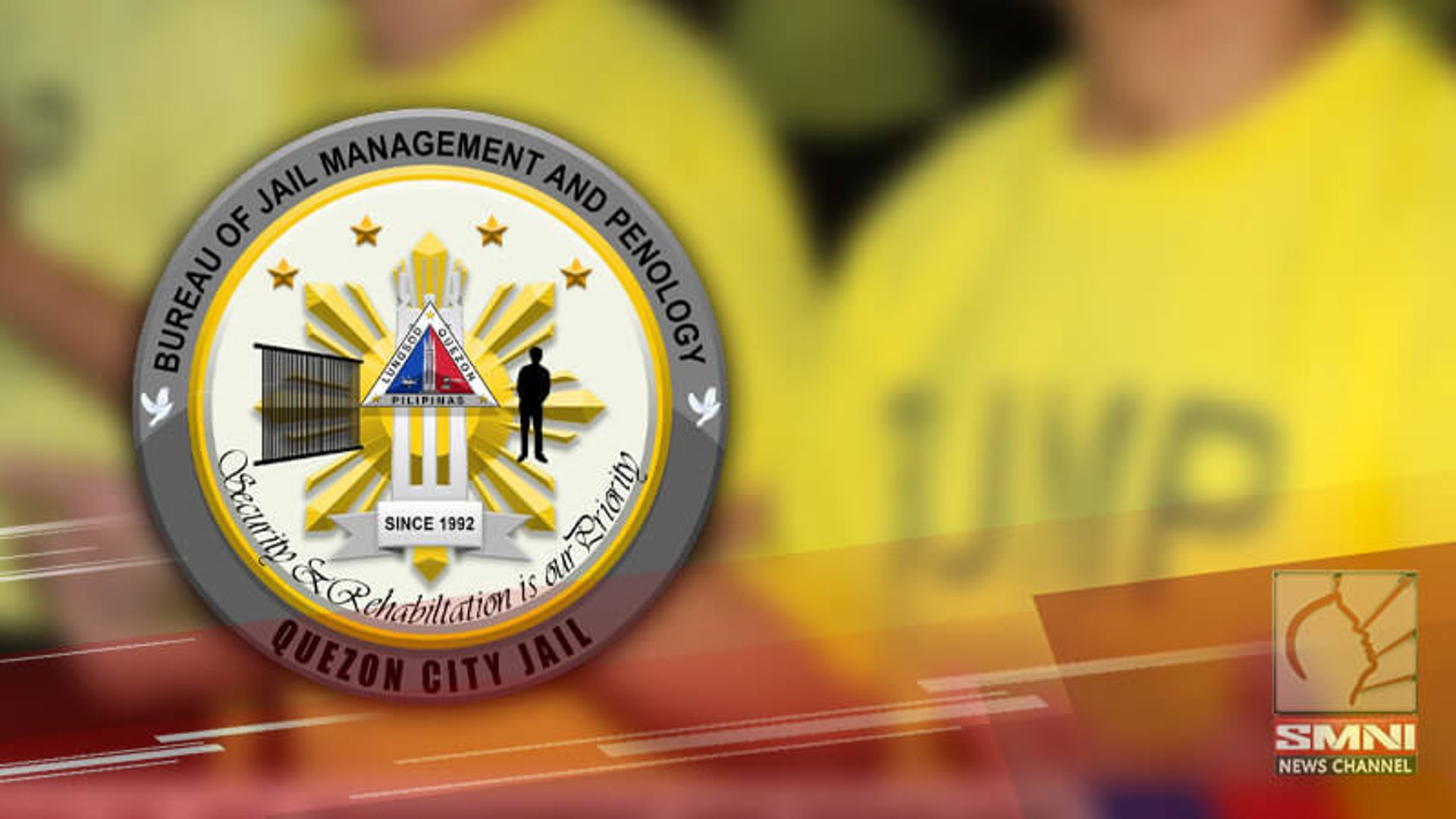
No Juan Left Behind
Quezon City Jail - Male Dormitory
headed by
JSUPT MARIA LOURDES P PACION, Jail Warden
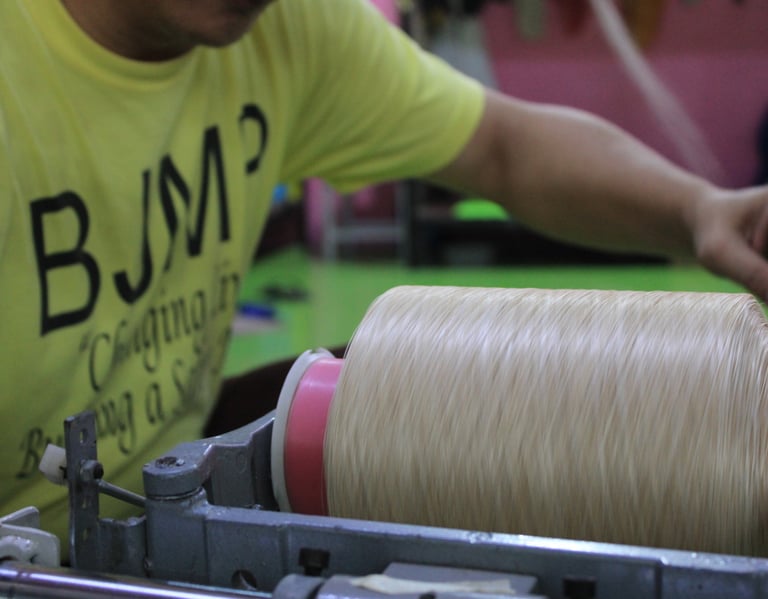

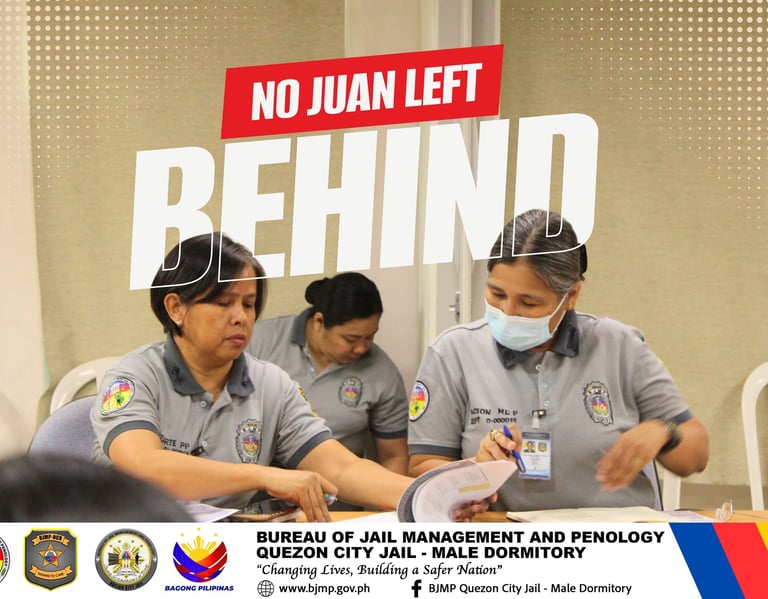



𝐍𝐎 𝐉𝐔𝐀𝐍 𝐋𝐄𝐅𝐓 𝐁𝐄𝐇𝐈𝐍𝐃
The No Juan Left Behind Program is modelled after the successful and widely recognized 'No Woman Left Behind' initiative implemented at QCJ-FD, which has shown significant impact in the lives of persons deprived of liberty.
This program will primarily concentrate on providing comprehensive support in the areas of education, health, and livelihood, ensuring that PDL receive the necessary skills, services, and opportunities to facilitate their successful reintegration into the community.
𝑻𝒉𝒆 𝑵𝒐 𝑱𝒖𝒂𝒏 𝑳𝒆𝒇𝒕 𝑩𝒆𝒉𝒊𝒏𝒅 𝒘𝒊𝒍𝒍 𝒔𝒐𝒐𝒏 𝒃𝒆 𝒇𝒐𝒓𝒎𝒂𝒍𝒍𝒚 𝒍𝒂𝒖𝒏𝒄𝒉𝒆𝒅 𝒂𝒕 𝒕𝒉𝒆 𝑸𝑪𝑱-𝑴𝑫
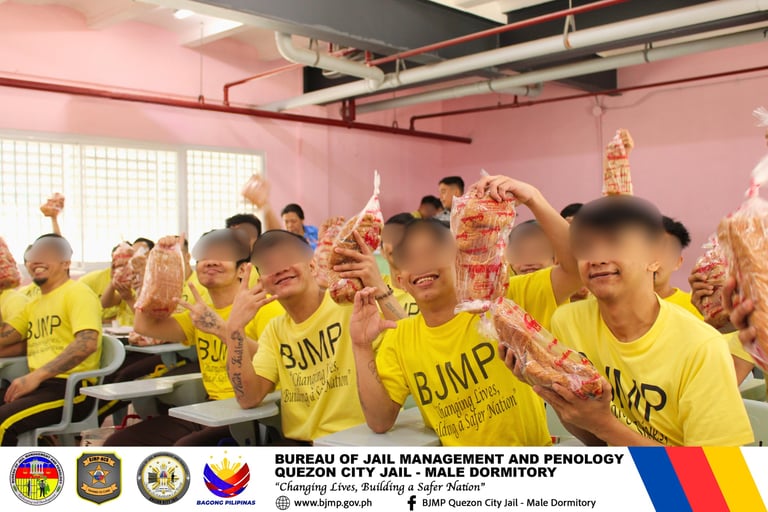

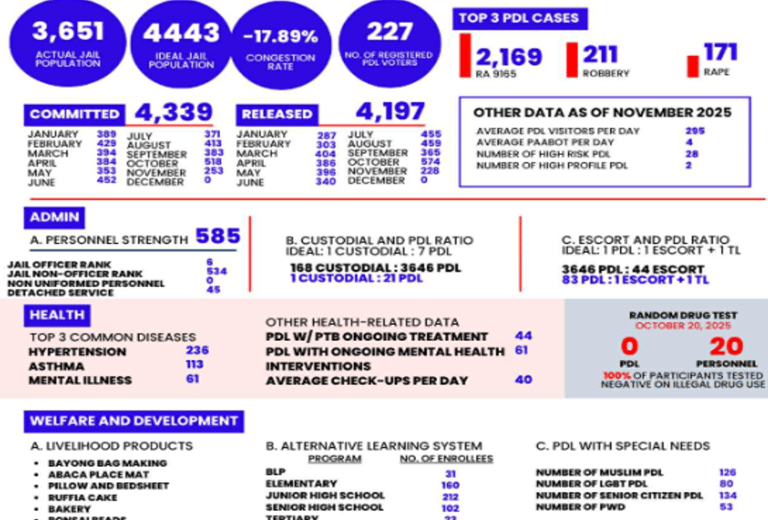

DEMOGRAPHIC DATA
Comprehensive Medical Laboratory for PDL
Providing complete diagnostic services to ensure early detection and proper management of illnesses.
List of Medical Laboratory Procedures:
1. PA Chest X-Ray
2. ECG
3. Urinalysis
4. Fecalysis
5. Complete Blood Count
6. Blood Urea Nitrogen
7. Creatinine
8. SGOT
9. SGPT
10. VDRL
11. Fasting Blood Sugar
12. Lipid Profile
13. Blood Uric Acid
14. HBsAg
15. Blood Typing
16. Drug Test
TB Control and Prevention Program
Strengthening early detection and management of tuberculosis within QCJMD.
a. Daily Directly Observed Treatment (DOT)
b. TB Laboratory utilization for rapid diagnostics
Funding request needed for:
Expired GeneXpert Warranty (Aug 2025 & Oct 2026)
Unserviceable CPU of GeneXpert Machine
c. Regular sputum screening for all new commits
d. TB education sessions per brigade
Nutrition and Wellness Enhancement for PDL
Promoting proper nutrition for improved health outcomes.
a. Nutritional assessment for all PDL
b. Specialized diets for TB, hypertension, diabetes, and GI cases
c. Double share program for undernourished PDL
Environmental Health
a. Regular insect and rodent control
b. Clean water access and water testing
c. Waste management and hygiene education
HIV/AIDS, STI, PICT
a. Provider-initiated counseling and testing (PICT)
b. HIV treatment linkage and monitoring
c. STI management and prevention education
d. Condom awareness for eventual reintegration
Special Care Program for Vulnerable Groups
a. Senior citizens
b. PDL with disabilities
c. Chronically ill (DM, HTN, CKD)
d. PDL with mental health concerns
Mental Health and Psychosocial Support Program
Ensuring mental health care accessibility for all PDL.
a. Mental health consultations and telepsych services
b. Stress management and coping-skills workshops
Drug Free Facility
Promoting a safe and drug-free facility.
a. Drug Awareness Campaign for PDL and personnel
b. Random Drug Testing of PDL (20% of population or approx. 750–800 PDL)
c. 100% Drug Testing of Personnel (543 personnel)
Prostate Screening and Andropause (Andropost) Assessment
Prostate Screening
Early detection of prostate-related conditions for male PDL, especially those aged 40 and above.
Digital Rectal Exam (DRE) – coordination with partner hospitals
Prostate-Specific Antigen (PSA) testing
Health education on prostate cancer and urinary symptoms
Andropause (Andropost) Assessment
Screening for hormonal decline among aging male PDL to improve quality of life.
Evaluation of symptoms (fatigue, low energy, mood changes, decreased libido)
Basic laboratory tests when needed
Counseling and referral for further management
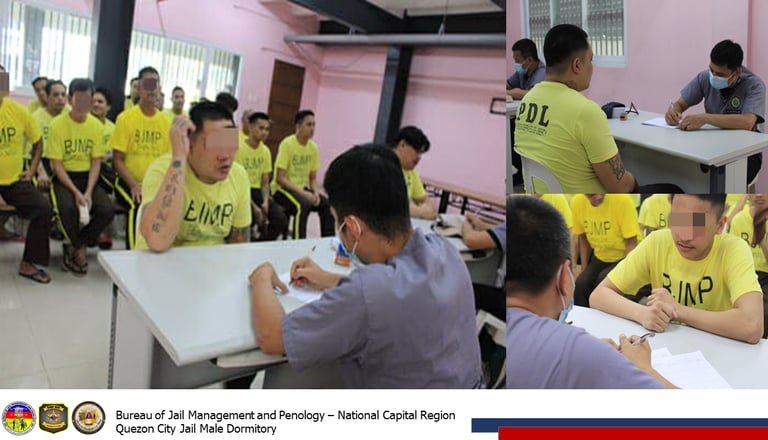

BJMP QUEZON CITY JAIL - MALE DORMITORY VIRTUAL MONITORING DASHBOARD
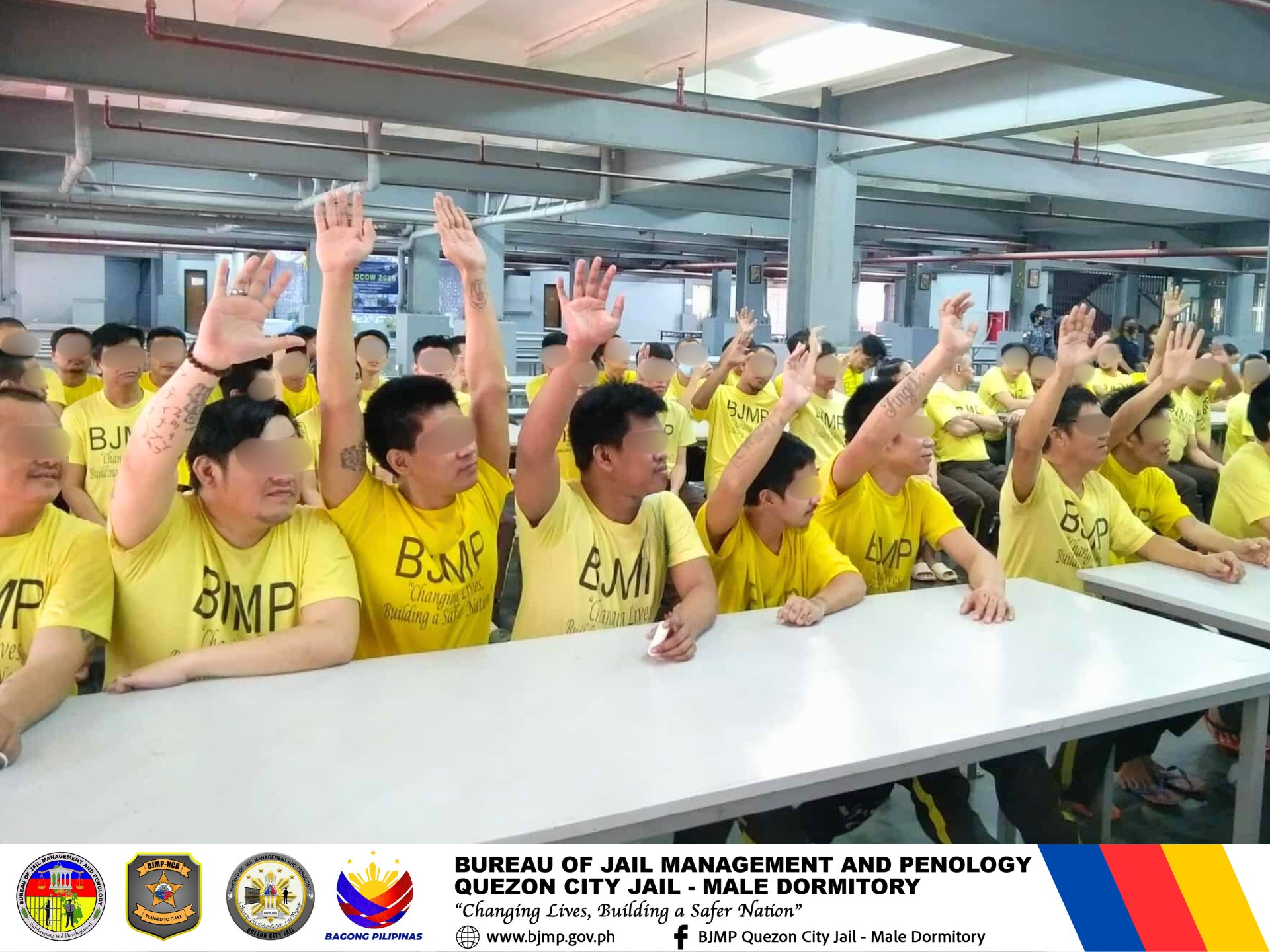
COMPREHENSIVE
Programs and Activities
1
This program ensures that PDL receive proper medical and mental health care. It includes regular health check-ups, counseling. This will reflect their respect for life and dignity that rehabilitation requires.
When health and hygiene are prioritized, discipline, order, and morale improve inside the jail. PDL learn the importance of self-care and responsibility, which strengthens their mindset for reintegration into society.
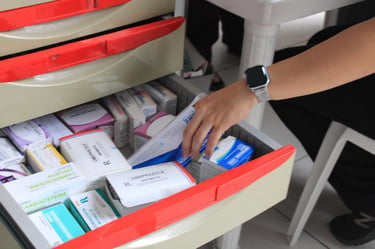

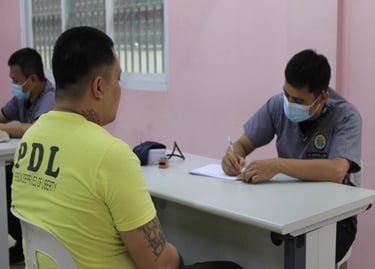

MENTAL HEALTH CARE SERVICES
Psychological Assessment
Counseling
Medication (if necessary)
Mental Health Awareness Program
Monthly Birthday Celebration of PDL


DRUG USE PREVENTION, TREATMENT, AND REHABILITATION PROGRAM
I. Prevention
Drug Abuse Preventive Education
Drug Test
II. Treatment and Rehabilitation
Intensive Out-Patient Program
In-Patient Program
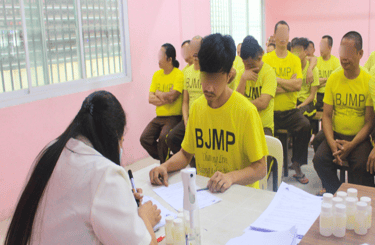

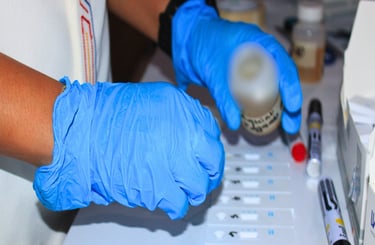

Medical Examinations
X-Ray
Urinalysis
Fecalysis
Electrocardiogram (ECG)
In-House Medical Services
HIV/AIDS Test
Prostrate Cancer
Provision of Flu Vaccine
Provision of Pneumonia Vaccine
Access to Medicine
HEALTH SERVICES
2
3
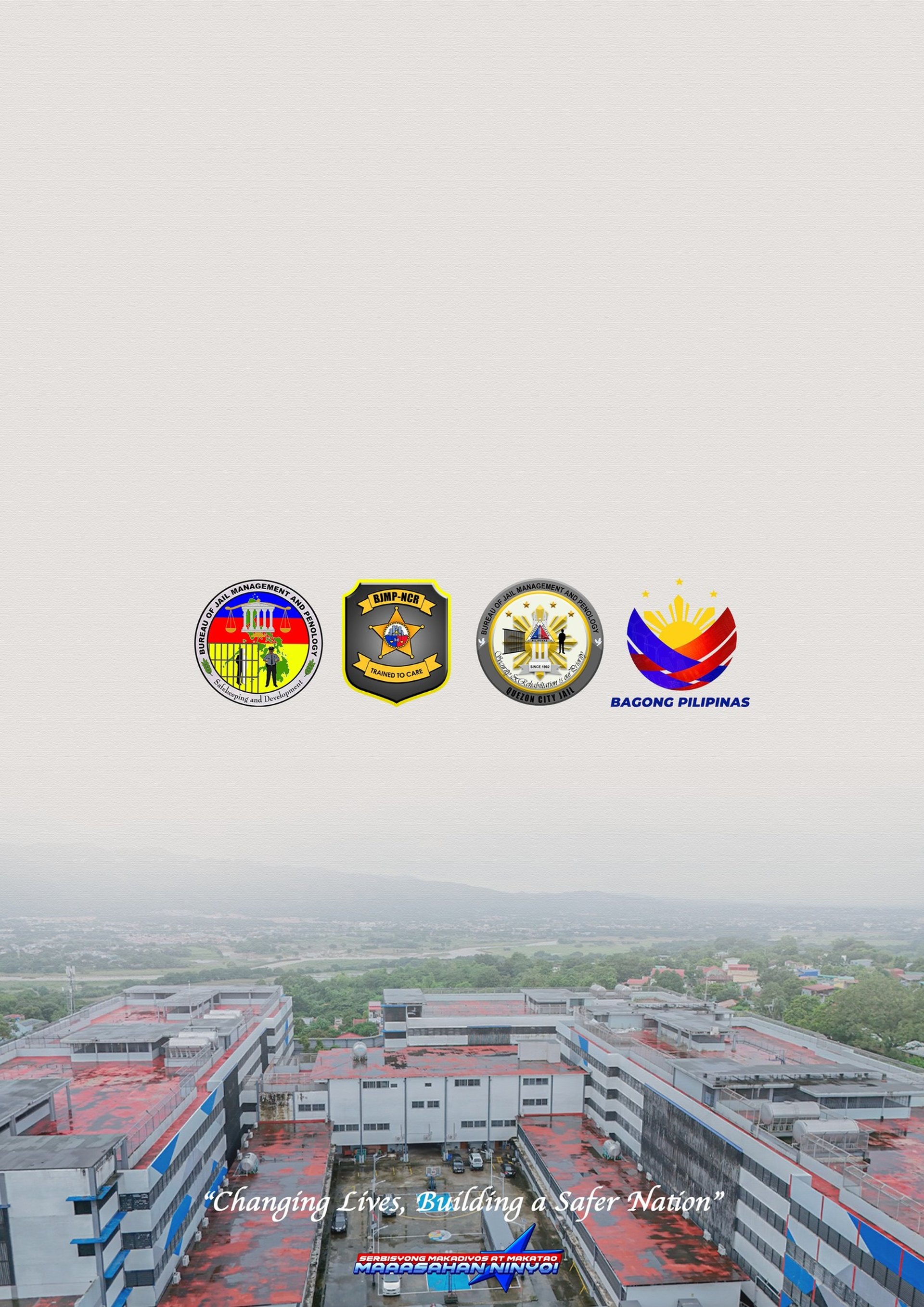
WELFARE AND DEVELOPMENT
EDUCATION PROGRAM
Alternative Learning System
Senior High School
College Education
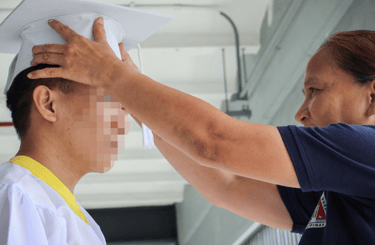

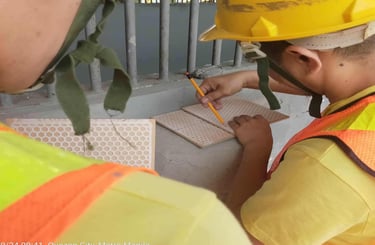

The Welfare and Development program in the Bureau of Jail Management and Penology (BJMP) Quezon City Jail - Male Dorm, like all BJMP facilities, is an essential part of its mandate to ensure the humane safekeeping and development of Persons Deprived of Liberty (PDL) in preparation for their eventual reintegration into society.
PROGRAMS
LIVELIHOOD PROGRAM
Livelihood Display Area at Jail Facility
Position in the City Hall for their display
Participation in bazaars and other events sponsored by the Local Government of Quezon City


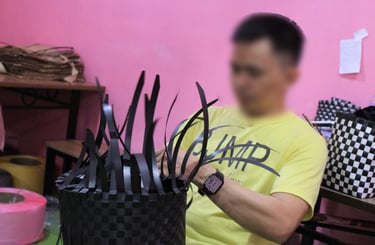

SKILLS TRAINING PROGRAM
Automotive
Wood Carving
Entrepreneurship
Food Service
Barista
Electrical wiring installation
Plumbing
Basic Electronics Repair
Welding
Food Processing and Preservation
Carpentry
Masonry
Urban Gardening/ Urban Fish Culture
AFTER CARE PROGRAM
Tindahan ni JOY
Coordination with PESO
TUPAD Programs
1
2
3


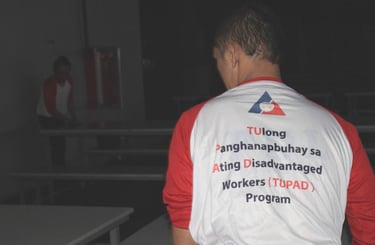

4
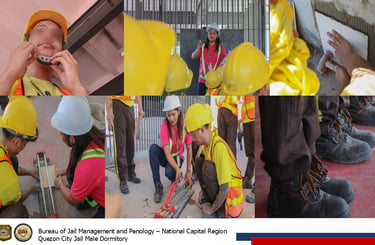

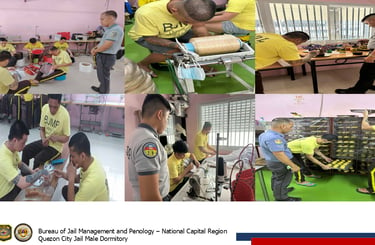

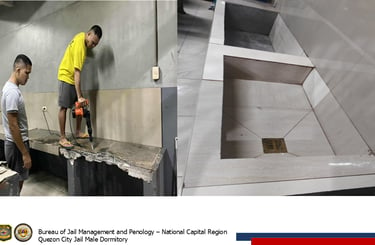

Comprehensive Legal Documentation Support for PDL
This program aims to assist Persons Deprived of Liberty (PDL) in securing their essential legal documents such as PSA-issued Birth Certificates, PhilSys ID, PhilHealth, SSS, and Pag-IBIG membership, as well as Quezon City Citizen ID, Senior Citizen ID, and PWD ID. Through close coordination with the Local Civil Registry Office (LCRO), PhilHealth, SSS, Pag-IBIG, and the Local Government of Quezon City, the program ensures that every PDL obtains proper identification and documentation
These documents will serve as vital requirements for their Alternative Learning System (ALS) enrollment, access to government benefits, and future employment opportunities upon release. By helping PDL establish their legal identity, the program promotes inclusivity, rehabilitation, and smooth reintegration into society
Jail Facility Maintenance and Infrastructure Improvement
A safe and humane environment is essential for rehabilitation. This program includes the regular maintenance of generators, elevators, plumbing, lighting systems, sanitation facilities such as the sewage system, cisterns, and water refilling station, as well as fire safety equipment. It ensures a functional and secure facility that upholds dignity and discipline.
Facility maintenance not only prevents hazards but also instills in Persons Deprived of Liberty (PDL) a sense of respect for order and cleanliness. A well-maintained environment reflects the discipline and responsibility expected of reformed citizens and supports the psychological well-being of both PDL and personnel.
Maintenance in Water Supply/ Cistern
A reliable and sufficient water supply is crucial in jail for maintaining hygiene, preventing disease and ensuring basic living condition of our PDL

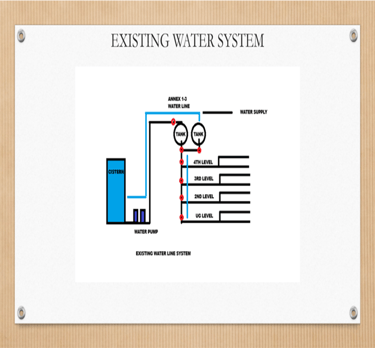
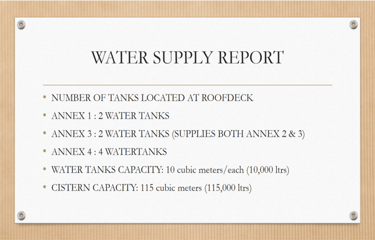
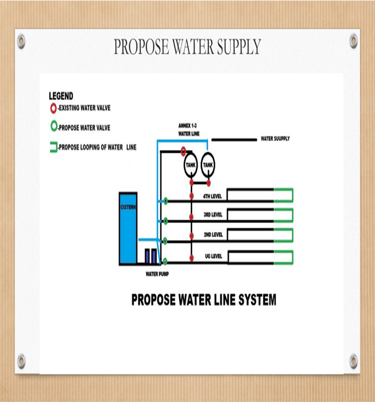
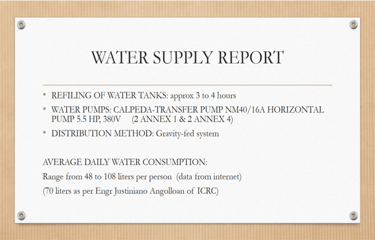





1
Maintenance for Sewage Treatment Plant
The STP uses filters to remove contaminant from wastewater, making it safe for discharge. However various filtration methods, including physical, chemical, and biological process are needed to achieve this. This filtration methods is important to remove wide range of pollutant, to ensure that the treated wastewater meets quality standard for safe discharge into the environment and also protect public health by removing harmful pathogens helping in preventing waterborne disease.
2
Maintenance and Support for 2 Generator
Maintaining a generator is important to ensure its readiness whenever needed. However, such task requires budget . For the 2 generator, it requires a Preventive Maintenance Service that helps prevent major issues and extend the life of the generator. Regular PMS ensures optimal performance, safety, and efficiency saving money on costly repairs down the road.
Presented is the requested quotation for the maintenance service.
3
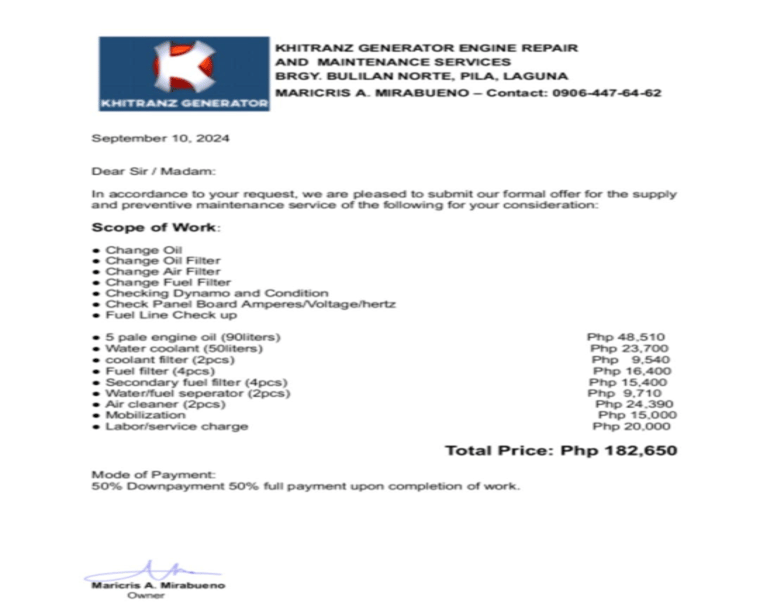

Maintenance and Repair of Elevator
Elevators are primarily used for the vertical transportation of people and goods within buildings and other structures. They offer convenience, accessibility, and efficiency, particularly for those with mobility issues, it is essential for emergency cases, like transporting of patients, medical personnel and equipment, for safety and comfort.
To guarantee safe and effective operation, elevator maintenance and repair entails routine servicing and problem-solving. This covers cleaning, lubrication, inspections, and any repairs required to maintain the elevator's proper operation and adherence to safety standards.
Presented is the Elevator Call Back Report from Hyundai
4
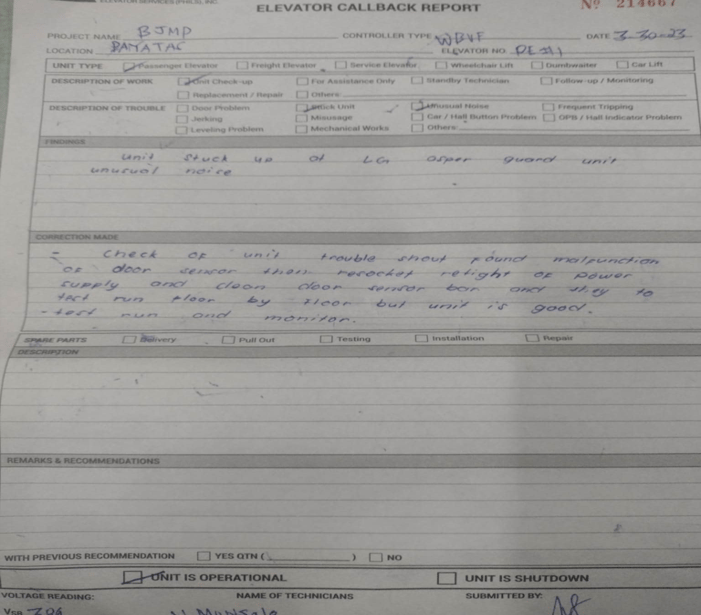

Maintenance and Repair of Water Refilling Station
The water refilling station is crucial for providing a safe, convenient, and more sustainable source of drinking water in jail. They promote environmental responsibility by providing a cost-effective alternative to bottled water and contribute to reducing plastic waste, promoting environmental responsibility.
Currently, the Water Refilling Station located in the facility is still non-working and requires parts and repair. Such mechanical defect causes disruption in the access to readily available source of portable water and could lead to increased reliance on potentially less safe or more expensive alternatives, like bottled water, or could also pose a greater risk of waterborne illnesses if individuals resort to consuming untreated water from other sources.
Additional Lighting’s and repair of Electrical system.
The maintenance and improvement of the electrical and lighting systems in the Quezon City Jail Male Dormitory aim to ensure a safe, secure, and functional facility for both PDL and personnel. Adequate lighting during daytime operations enables PDL to perform their daily routines, participate in rehabilitation programs, and maintain cleanliness and order within the premises.
However, certain areas become dim or poorly illuminated during nighttime, posing potential security and safety risks. The installation of additional lighting fixtures will significantly strengthen the facility’s security measures by improving visibility, preventing possible escape attempts, and enabling more efficient monitoring of all areas.
A well-lit and properly maintained environment promotes discipline, orderliness, and responsibility among PDLs—essential values that contribute to their rehabilitation and eventual reintegration into the community as law-abiding and productive citizens.
5
6
Establishment of Mental Health Hub
The establishment of a Mental Health Hub with 10 roving psychologists from the LGU is essential to address the growing mental health needs of Persons Deprived of Liberty (PDL) at the Quezon City Jail. With an estimated 250 new PDL committed weekly, many enter the facility carrying emotional distress, trauma, anxiety, depression, or substance-related issues.
Without proper assessment and early intervention, these conditions may worsen, leading to behavioral problems, self-harm, or difficulty adjusting to the jail environment. A dedicated Mental Health Hub ensures that every newly committed PDL receives a timely psychological evaluation, proper referral, and counseling support.
Furthermore, it promotes a safe, humane, and rehabilitative environment, aligning with the Bureau of Jail Management and Penology’s (BJMP) mission to reform and reintegrate PDL into society as mentally healthy and responsible citizens. Through continuous monitoring and intervention by the roving psychologists, the program can significantly reduce incidents of violence, improve discipline, and support the overall well-being of the PDL population.
7
The “No Juan Left Behind” program upholds the true essence of rehabilitation—ensuring that every Person Deprived of Liberty, regardless of background or circumstance, is given equal access to education, mental health care, skills training, and reintegration support. By establishing programs like the Mental Health Hub and other developmental initiatives, we are not only strengthening security and discipline but also restoring dignity, hope, and purpose among PDL.
Approving this program means believing in second chances—that every Juan has the potential to change, to heal, and to contribute positively to the community once released. It is a step toward a more compassionate, inclusive, and progressive correctional system where truly, no Juan is left behind.
CONTACT US
Address
Payatas Road, Quezon City Metro Manila, Philippines
Contact #:
09123456789 / 09235256736
Email Address:
ncr.quezoncjmd@bjmp.gov.ph
Bureau of Jail Management and Penology Office Links
Online Services
Downloads
Linked Agencies
